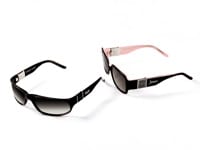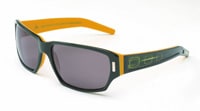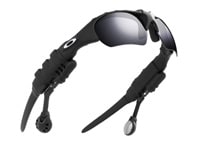By Special
Request
How to go the extra mile for your patients without breaking the bank
By Joanne F. Schell
|
|
|
|
Novelty/Special Features |
|
At Mr. I's, a South Miami-based dispensary, uncommon requests are an everyday occurrence for managing optician Dawn Lerner. "That's the kind of place we run," she says. From one-of-a-kind rimless and semi-rimless lens shapes to custom frame color combinations, Lerner has determined that saying "yes" to customers has resulted in a successful business.
Part of the reason Mr. I's can offer these specialized services is its in-house lab.
"Asking the vendor to manufacture one special pair of glasses would be impossible," she says. "It's too long of a process. It's not possible for them to be so customer oriented." Lerner adds that having her own lab allows her to be more creative in her frame and lens offerings. For other opticians, a strong relationship with an independent lab can accomplish the same results.
Although Michigan-based Eyecare Associates has an in-house lab, optical department manager Cynthia Perkins, ABOC, outsources many of the special bifocal requests she gets from sports enthusiasts.
"I will often get golfers who want a bifocal just in the top corner of one lens so that they can see their scorecard but not inhibit their vision during play," she says. "I have an excellent relationship with my lab, so when I call with a need like that, they can handle it."
This relationship, how-ever, needs to be reciprocal. Lerner says that offering customization can produce a lot of waste, so she often makes demo lenses for customers before putting the prescription order in to her lab.
"We keep a certain amount of specialty items in stock, so that patients can see the product and know how it works before they place an order," says Tracy Wilson, manager of Eye Health Northwest, a dispensary based in Portland, Ore.
|
|
|
|
Novelty/Special Features |
TOO MUCH OF A GOOD THING
For many dispensers, however, keeping product in stock that is not a common seller can drain the budget. Knowing the needs of your clientele is key to striking a balance between ordering enough product to service your patients and not having an overflow of specialized inventory.
"I do keep a lot in stock," says Penny Hart, optician at Professional Opticians in La Grange, Ga. "I have lots of repeat clients, and I know what they are going to need."
"In the beginning, I hardly carried anything like that," adds Perkins. "But as I got to know my clientele, and word spread that I could fulfill special needs, my inventory grew."
SPECIAL CONSIDERATIONS
At Oculus 20/20, a Brooklyn, N.Y.-based dispensary, owner Amir Poran offers frames in color combinations not typically available through the vendor.
"If the collection carries 30 colors, but the model the customer is looking at only has five, we can custom make a new frame," he says.
Providing this kind of service is fairly easy. Lerner, for example, will simply order another pair of temples from a vendor to place on a frame in the dispensary.
Other projects, however, can be more intensive and costly. "We use semi-rimless frames and take the wires out to create entirely new models," explains Poran. To be able to fulfill these requests, he covers his costs by not discounting frames.
"People who request custom eyewear should expect to pay for the service they get," he says.
But, sometimes the cost just has to be swallowed, Professional Opticians' Hart says. One patient, for example, has a +16.00 prescription. "You can't make a normal profit on a special prescription like that," she says. "The price will be too high for the patient to afford."
Although Perkins might lose profit on specialty eyewear, those patients will likely return to purchase their next pair of frames. "One of the best things you can give your patients is 100 percent service," she says. "That will make them come back again and again."
|
Specialty Gallery |
|
|
|
|
|
|
|
|
|
|
|
|
|
|
|
|
|
|
|
|
Take it to the Limit |
Offering limited frame collections in your store can create a lot of buzz. Dawn Lerner, managing optician for Mr. I's in South Miami, carries just enough to create interest. While Lerner knows she won't sell a host of these frames, they do create traffic. "People come in to try it on, and they will end up buying something else," she says. "But it gets them in the store." When placing an order for a limited edition, Lerner says she often purchases just enough to show the diversity of styles without investing in the whole collection. "I generally don't order one of anything. Two pieces is reasonable." Knowing your clientele can also help to determine whether limited edition purchases are appropriate. Eye Health Northwest carries a small amount of limited edition frames, but they do keep in stock the items that have been in high-demand. "We carried some high-end (limited edition) frames that sold very well," says Tracy Wilson, manager for the Portland, Ore., dispensary. "Now we keep them in stock because demand has risen from word of mouth." Even though limited editions may not be huge sellers, purchasing a few frames can strengthen the relationship with your sales rep. "I want to make the vendors happy and keep the brand alive and vivid," says Amir Poran, owner of Oculus 20/20, a Brooklyn, N.Y.-based dispensary. "You have to support the frame companies. You're the messenger for this vendor, and there is a reciprocal relationship." "With a good vendor, I can order a frame and try it out in the store," says Lerner. "But I have the security of knowing that if it doesn't sell, I can usually return it." Don't let the frames get stale on your frame board, she warns. "I try to keep limited edition frames for 90 days. But if it doesn't sell, it gets sent back." |
















